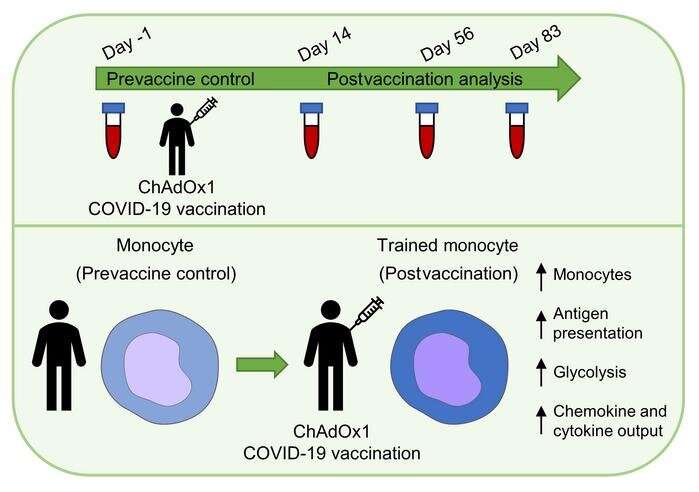This article has been reviewed according to Science X's editorial process and policies. Editors have highlighted the following attributes while ensuring the content's credibility:
fact-checked
peer-reviewed publication
trusted source
proofread
Research indicates wider benefit to AstraZeneca vaccine

A review of the COVID-19 vaccine trials indicate that adenovirus vectored vaccines may have non-specific protective effects resulting in significantly reduced all-cause mortality and non-COVID deaths, compared with mRNA based COVID-19 vaccines. The mechanism behind this observation is unknown.
New Trinity research has discovered that the AstraZeneca (AZ) COVID-19 vaccine can induce a phenomenon known as "trained immunity" in people after their first dose, which may contribute to the non-specific protective effects resulting in reduced all-cause mortality.
The study is published in the Journal of Clinical Investigation.
Findings show that the AZ vaccine increased the recipient's innate immune response to bacterial infections (compared with innate immune responses induced in the same person prior to vaccination); with enhanced production of key molecules called cytokines and chemokines, that mediate effective immune responses resulting in the killing of bacteria and virally infected cells.
The research suggests that the vaccine may boost immune responses to bacterial infections and therefore protect the recipient from more than just COVID-19. This reprogramming of the innate immune system by the first dose of the vaccine resulted in enhanced non-specific immune function up to 3 months later.
Dearbhla Murphy, the Ph.D. student in the Basdeo Lab at Trinity, said, "This research will help us understand the broader effects of vaccination with adenovirus platforms and may guide the design of a ready-to-use vaccine platform that can be rapidly developed to protect us against emerging infectious diseases. The off-target protection from the vaccine is especially exciting as it could promote general good health and boost our immune systems, reducing the incidence of other infections and our reliance on antibiotics."
Dr. Sharee Basdeo, principal investigator of the Human and Translational Immunology Group based in the Trinity Translational Medicine Institute at St James's Hospital and senior author, said, "The role of innate immunity in promoting post vaccine health is not yet fully appreciated. Therefore, tracking innate as well as traditional adaptive immune responses to vaccination against emerging infections may help to identify optimal vaccine platforms, prime/boost regimens, and limit serious side effects. Our work improves the understanding of the contributions of innate immune function to specific and non-specific effects of vaccines and may lead to the development of innovative vaccine design for difficult to treat infectious diseases that remain a global threat to public health."
More information: Dearbhla M. Murphy et al, Trained immunity is induced in humans after immunization with an adenoviral vector COVID-19 vaccine, Journal of Clinical Investigation (2022). DOI: 10.1172/JCI162581


















